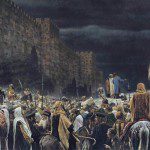I love your statutes, your precepts, your judgments, your testimonies, your commandments, your law, your promises, your word: so many dimensions to the Psalmist’s delight not only in what God teaches him, but in the variety of the ways God does that.
There are both obvious and subtle differences among the words in this list of God’s gifts to a people in need of guidance. Each of them testifies to the persistence and flexibility and reliability and richness of the ways God invites us into relationship.
I learned something about loving the law from a rabbi years ago when I was teaching at a Catholic high school. An orthodox rabbi came to speak, invited by a religious studies teacher. He was young and smart and hadn’t met a gentile until he was 26. As he outlined the elaborate laws that circumscribe daily life for orthodox Jews, one of the students, awestruck, asked, “How can you stand being so hemmed in by all those laws?” His answer, delivered with a sweet smile, was an edifying reminder of the Psalmist’s own love: “I love the law. It gives us guidance and clarity. It gives shape and purpose to our days. It is a gift from the Creator that keeps us in right relationship to him and to creation.”
That understanding of the law seems to bring it close to another term the Psalmist includes in his litany of gratitude: the English word precept offers its own good reminder of how God invites and guides us. It is a teaching or rule of order, but its root meaning in Latin is “to take beforehand”—a precept equips you for what you are about to undertake or risk or discern. At Princeton, where I attended graduate school, teaching assistants are called preceptors, I suppose because their task is to prepare students to hear the heavy-duty lectures they hear from the big-time academics and Nobel prize winners. It is pastoral work. God’s precepts prepare and equip us for what we face. They are something to be grateful for as we are grateful for the gear and tackle and trim that equip us for our trades and our travels.
The psalmist also loves God’s promises. A promise is, or is supposed to be, something you can rest in. So you don’t have to be hypervigilant. That’s a term often applied to children who can’t rest secure in parents’ loving correction and patient acceptance. They have to be watchful all the time so as not to displease those who might abuse them or betray their trust. What a gift a promise is from a trustworthy source. We all break them—to ourselves and to others—out of weakness or inadvertence. But to know God’s promises are true is to be able to let go and play in the fields of the Lord, secure and safe.
And God’s commandments are true too, so the Psalmist points out. Not true as in a factual claim, but true as in a plumbline. We can count on them. We can come back to them. At one point in her adolescence, one of our daughters came out in a burst of impatience with the surprising complaint “Look, I just want to know what the rules are.” She wanted more rules. She was tired of permission and responsibility she wasn’t ready for. Rules are guidelines to count on even when we break them, and God’s commandments can be counted on utterly, however we read them, however we find we need to adapt them to a new idiom, they’re true like the plumbline, or like true north. And with the Psalmist, we can say joyfully, thanks be to God for that.
And for God’s very judgments. Our son, who is a public defender, told us early in his challenging career that it wasn’t the edgy, angry kids or their desperate parents who take him to the edge of burnout; it’s corrupt judges or judges who don’t care or judges who administer the law without imagination or compassion. One of the passages I find most moving in The Scarlet Letter, a book I’ve long loved, is the one where Arthur Dimmesdale, the guilty pastor who, we infer, is the father of Hester’s illegitimate child, bursts out that he longs for and looks forward to the day of judgment when all burdens will be laid down and all secrets known. Really. He longs for exposure and judgment. What comes clear in that longing is the profound trust he puts in the righteousness and mercy of God’s judgments. Like the Psalmist, he knows they will be true.
I love your word. That about covers it. Every word is a gift, every word an invitation to consider the ways things happen, how they are connected, what they require of us. A quotation I’ve posted at the top of my much-neglected website brings me back to a place this Psalm points to as well: “There is a blaze of light in every word.” No matter how dim it may become at times, that blaze is a flicker of the original light source who was the Word, in the beginning. It warms us and lights our dark nights. Thanks be to God.











